The Masters at 90: A decade-by-decade look at history, from Bobby Jones to Tiger Woods
With the cheers for his 1930 Grand Slam still echoing, Bobby Jones was shown a piece of property some two hours east of his Atlanta home.
The long-ago indigo plantation had more recently been a sprawling nursery, home to a wide variety of plants and trees across its undulating acreage.
"Perfect!" Jones said. "And to think this ground has been lying here all these years waiting for someone to come along and lay a golf course upon it."
His dream course opened in 1933 to wonderful reviews, but what's a great golf course without a great championship? Using his influence and connections, in 1934 Jones debuted a golf tournament he'd scarcely recognize today, aside from the familiar property and stately clubhouse.

The Masters turns 90 this year. With the exception of three dormant springs during World War II, 87 Masters Tournaments have been played. Along the way, it became recognized as one of golf's four professional major championships. There was no formality about such things — befitting the host course's previous life, it happened organically.
Unlike the other three majors, the Masters is played on the same golf course every year. Many say the year-to-year familiarity gives the Masters an advantage in terms of cementing memories and legacies. Assuming there's truth to that, you have to agree the advantage hasn't been squandered.
Decade One: 1934-43
Bobby Jones putting on what’s now the 12th green @ Augusta National. 1934 pic.twitter.com/WEZhYGdclb
— Michael Wolf (@bamabearcat) April 2, 2022
1934: Horton Smith wins the first Augusta National Invitation Tournament, taking the lead with a birdie on 17, which would later become No. 8, and winning by a shot over Craig Wood. Club co-founder and tournament host Bobby Jones, retired for four years following his 1930 Grand Slam, agrees to play and finishes in a tie for 13th.
1935: The two nines are reversed, giving the more photogenic nine the bigger late-round stage, and boy does it pay off quickly. Gene Sarazen's 4-wood from 235 yards out on the par-5 15th finds the cup for a double-eagle. He ties Craig Wood through 72 holes and beats him by five in an 18-hole Monday playoff.
1937: Byron Nelson wins the Masters for the first of his five major championships.
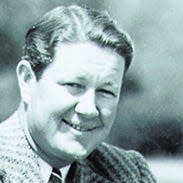
1939: After five years as the Augusta National Invitation Tournament, Bobby Jones relents and agrees to rename it The Masters Tournament.
1940: Lloyd Mangrum’s Thursday 64 was a course record that would last until 1986.
1941: Craig Wood finally wins a major with his Masters victory. Long before Greg Norman became a tortured soul in majors, Wood had lost all four major championships in playoffs.
1942: Byron Nelson wins the last Masters for the duration of World War II. During the war, Augusta National becomes home to grazing cattle and roaming turkeys, all part of the war-time food effort.
Decade Two: 1944-53
1946: Herman Keiser wins the Masters for his only major title, but only after Ben Hogan 3-putts the 72nd hole.
1948: Bobby Jones plays his final Masters.
1949: Sam Snead wins the first of his three Masters and is the first to be awarded the coveted green jacket
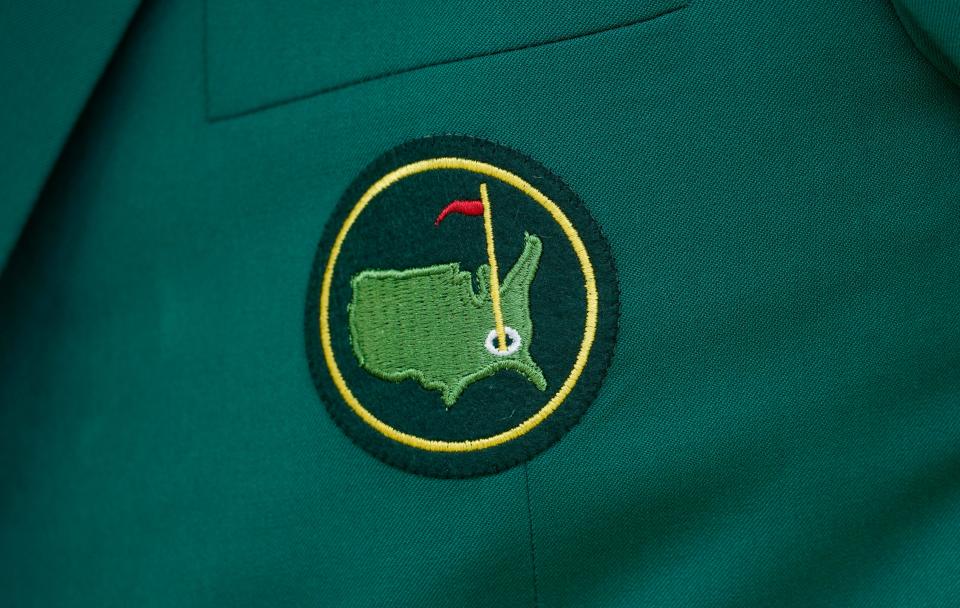
1950: Jimmy Demaret becomes the first three-time winner.
1951: Ben Hogan wins his first masters, and two years later his second.
1952: Ben Hogan begins the tradition of a pre-tournament champions dinner.
Decade Three: 1954-63
1954: Sam Snead joins Jimmy Demaret as a three-time Masters winner. He's helped when the leader, amateur Billy Joe Patton, makes bogey and double-bogey on the closing nine's par-5s.
1956: Another amateur, Ken Venturi, leads by four shots through Saturday but shoots a Sunday 80 to lose by one to Jack Burke Jr. Also in '56, CBS airs the final two rounds for the first time.
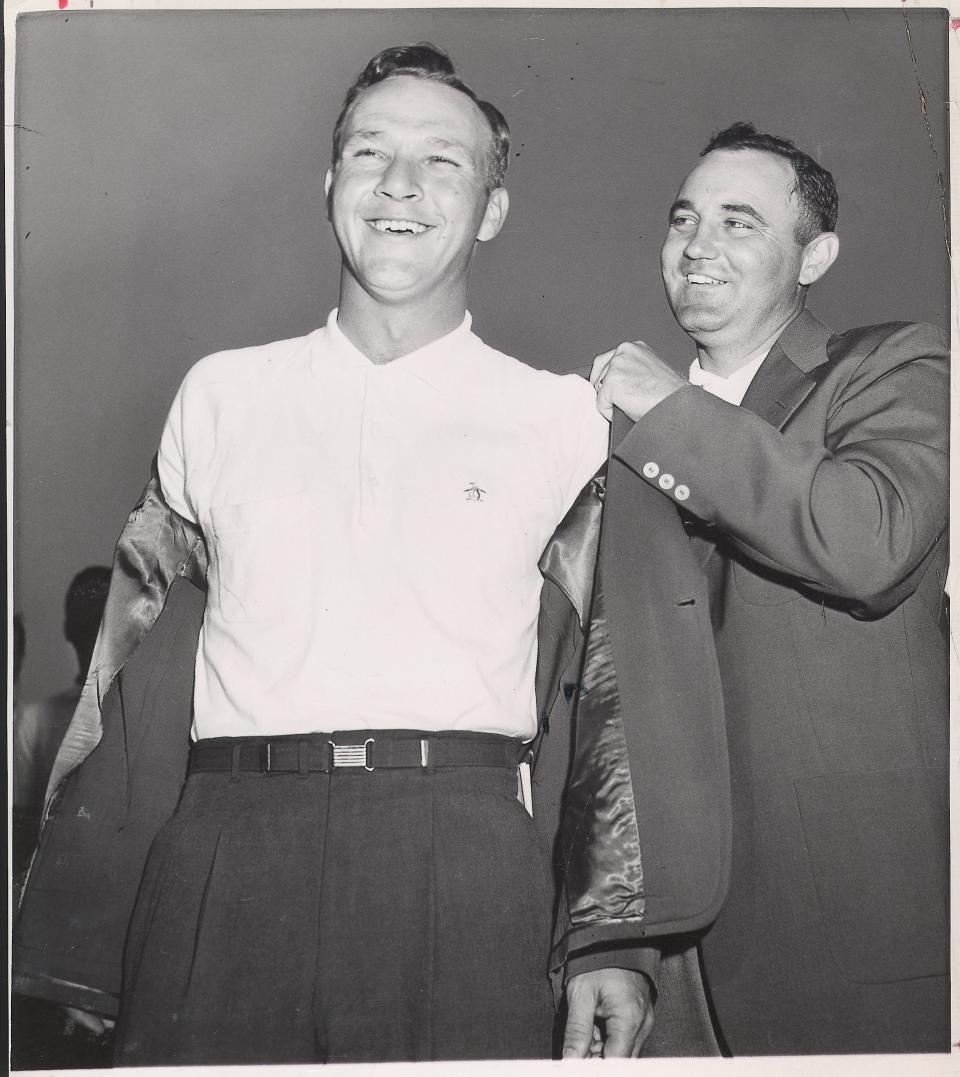
1958: Arnold Palmer wins his first Masters, and sometime during this time frame, with help from soldiers stationed at nearby Camp Gordon, "Arnie's Army" is born. Also this year, the term "Amen Corner" is pinned on holes 11-13 by writer Herbert Warren Wind, and the Corner's two bridges — named for Ben Hogan and Byron Nelson — are dedicated.
1960: Sam Snead wins the first Wednesday Par-3 tournament on Augusta National's picturesque par-27, downhill from the clubhouse.
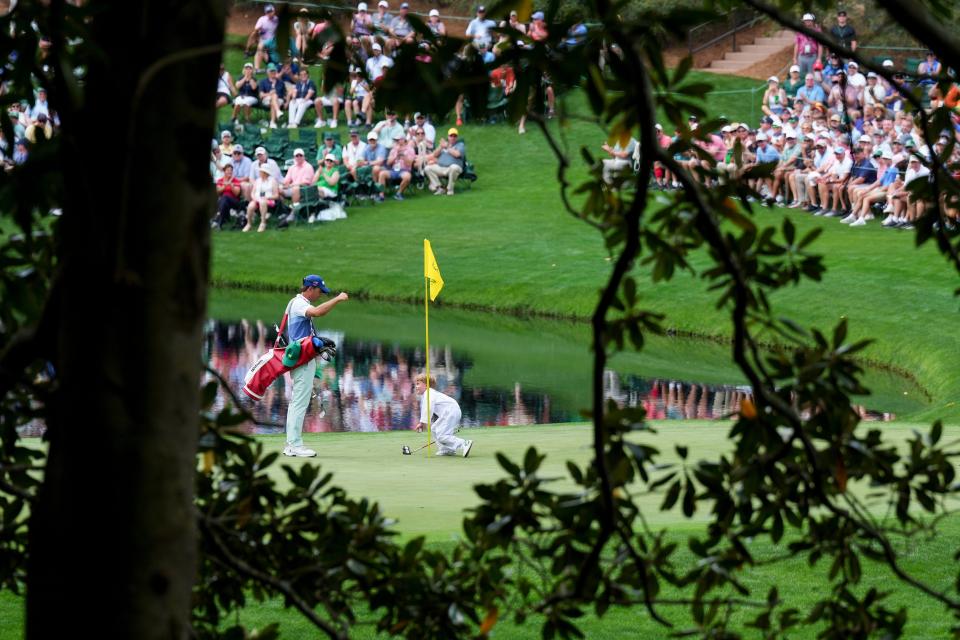
1961: Gary Player becomes the first foreign-born champion when Arnold Palmer, leading by one, double-bogeys the 72nd hole from a greenside bunker.
1963: Jack Nicklaus wins his first Masters and second major, by one shot over "Champagne Tony" Lema. The tradition of honorary starters begins, with past major champions Jock Hutchison and Fred McLeod getting things going on Thursday morning. They shared the duties through 1973.
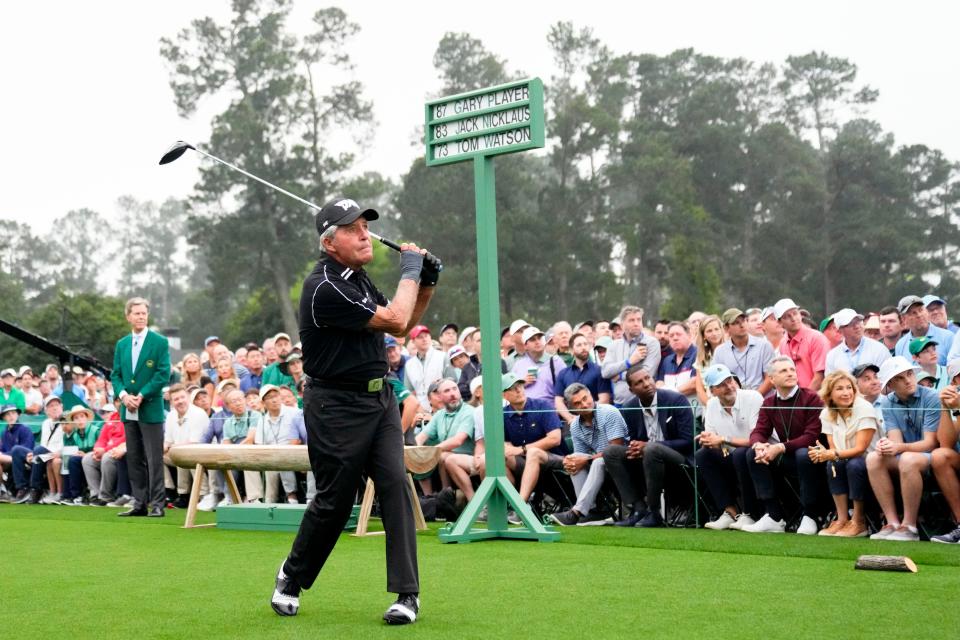
Decade Four: 1964-73
1964: Arnold Palmer wins his fourth Masters.
1966: Jack Nicklaus becomes the Masters' first back-to-back winner, beating Tommy Jacobs and Gay Brewer in an 18-hole Monday playoff. Also in '66, CBS commentator Jack Whitaker refers to a crowded gallery scene as a “mob” and is removed from the booth for five years.
1968: Bob Goalby ties with Roberto De Vicenzo but wins when De Vicenzo signs an incorrect scorecard. "What a stupid I am," De Vicenzo famously says.
1972: Jack Nicklaus joins Arnold Palmer as a four-time Masters winner. It's the first Masters played since the passing of Bobby Jones, who died the previous December at age 69.
#TBT......Arnold Palmer and Jack Nicklaus 1972 Masters pic.twitter.com/gKOwjxCsDH
— Cossett Creek (@CossettCreek) November 24, 2016
1973: Gene Sarazen, at 71, plays his 34th and final Masters.
Decade Five: 1974-83
1975: Jack Nicklaus beats Tom Weiskopf and Johnny Miller by one in what's considered one of the all-time greatest Sundays of major championship golf.
I love this clip of Jack Nicklaus hitting a 1 iron into the par 5 15th hole at the 1975 Masters from 220 yards. Probably the best long iron player of all time.
pic.twitter.com/5y2wNQAsTa— Tour Pro 🏌️♂️ (@OfficialTourPro) March 14, 2024
1976: Raymond Floyd ties the scoring record at 17 under by dominating the par-5s, playing them in 14 under par for the week and winning by eight.
1978: Gary Player wins his third Masters and the last of his nine majors. At 42, he's the oldest Masters winner at the time.
1979: Fuzzy Zoeller beats Ed Sneed and Tom Watson in the Masters' first sudden-death playoff. Sneed bogeys the final three holes of regulation.
1980: Seve Ballesteros wins the first of his two Masters, by four shots.
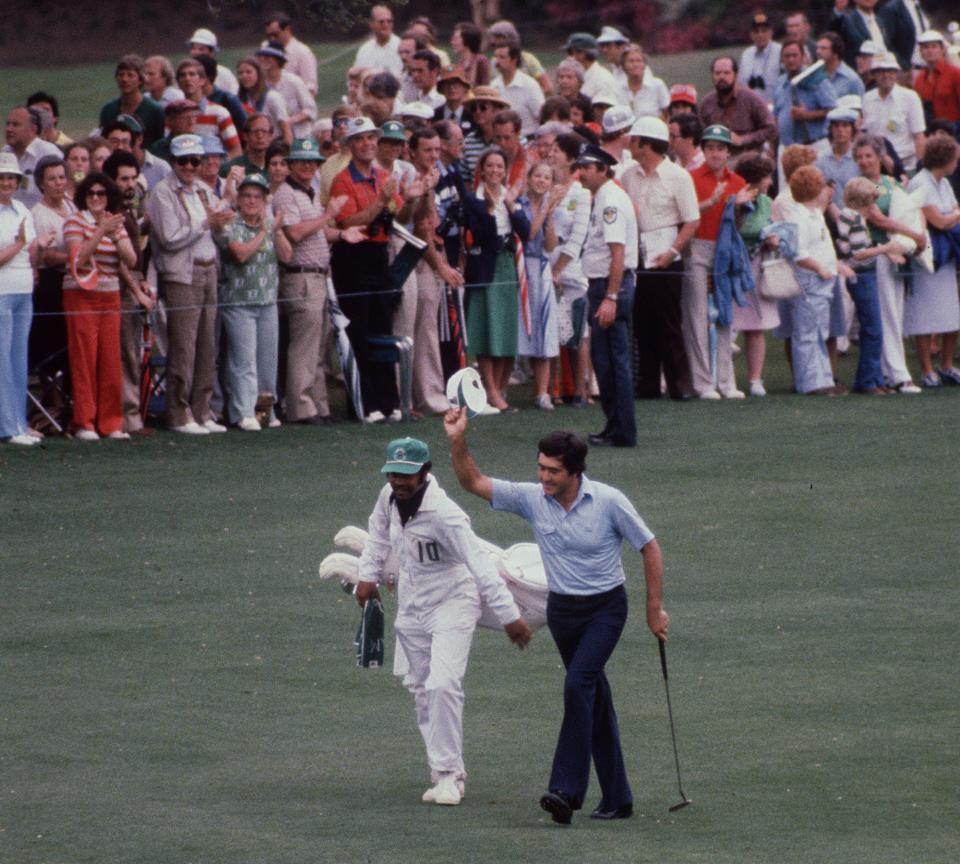
1981: The first Masters played on Augusta National's new bentgrass greens, which secure the ability to supply consistently faster putting surfaces year after year. Tom Watson wins by two shots.
1983: Arnold Palmer makes the 36-hole cut for final time at age 53. Sam Snead, 70, plays his final Masters. For the first time in tournament history, players are allowed to use their own caddies and not one from the club's caddie roster.
Decade Six: 1984-93
1985: Curtis Strange opens with an 80 but leads by three with six holes remaining Sunday. However, he finds water on both incoming par-5s. Bernhard Langer wins by two shots.
1986: After a career of signature victories, 46-year-old Jack Nicklaus delivers a comeback championship for the ages, defeating a Who's Who of international golf stardom during a stirring Sunday charge. It's his sixth Masters and 18th and final major championship.
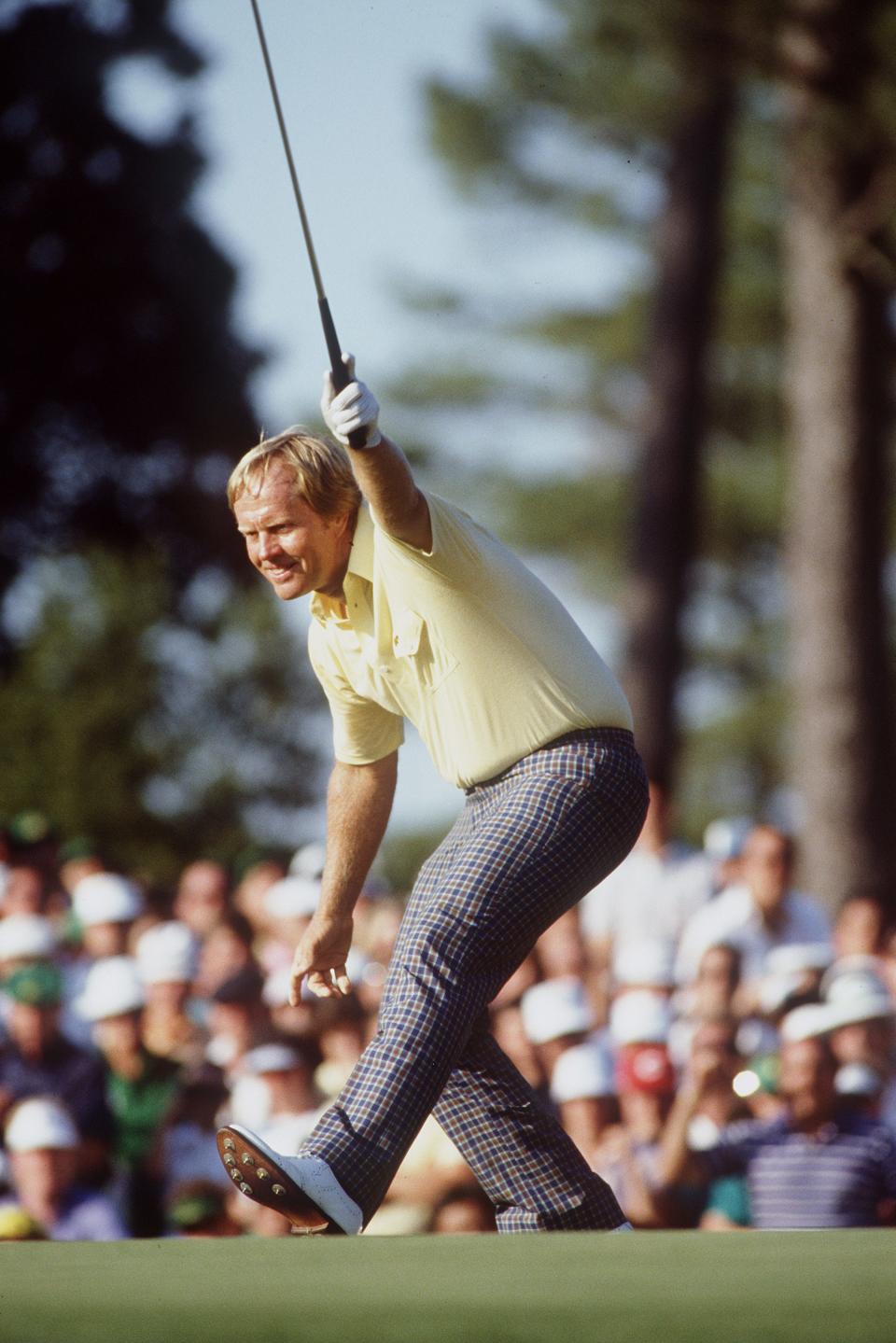
1987: Larry Mize’s chip-in on the second playoff hole takes its place in line among the Greg Norman heartbreaks at Augusta and elsewhere.
1989: Scott Hoch misses a two-foot putt for victory on the first playoff hole and Nick Faldo wins his first Masters on the next hole. Greg Norman bogeys the 18th to miss the playoff by one shot. Faldo would win again the next year in a playoff with Raymond Floyd.
1992: Fred Couples wins by two, largely due to defying gravity. His tee shot on the par-3 12th lands on the steep bank of Rae's Creek and somehow stays put instead of rolling back into the water. He chips close and saves par.
While I love the amazing current practice facility, I sometimes really miss the old driving range (& net) at The Masters! Opening round in 4 months. Can’t get here fast enough. pic.twitter.com/OVymyKVahV
— Bill Davison (@billdavison1p) November 7, 2022
1993: John Daly returns for his second Masters and finds that the net at the end of the driving range has been raised from 50 to 65 feet, offering additional protection for those walking or driving along Washington Road. The net would be raised a few more times before the club opens its new practice facility in 2010.
Decade Seven: 1994-2003
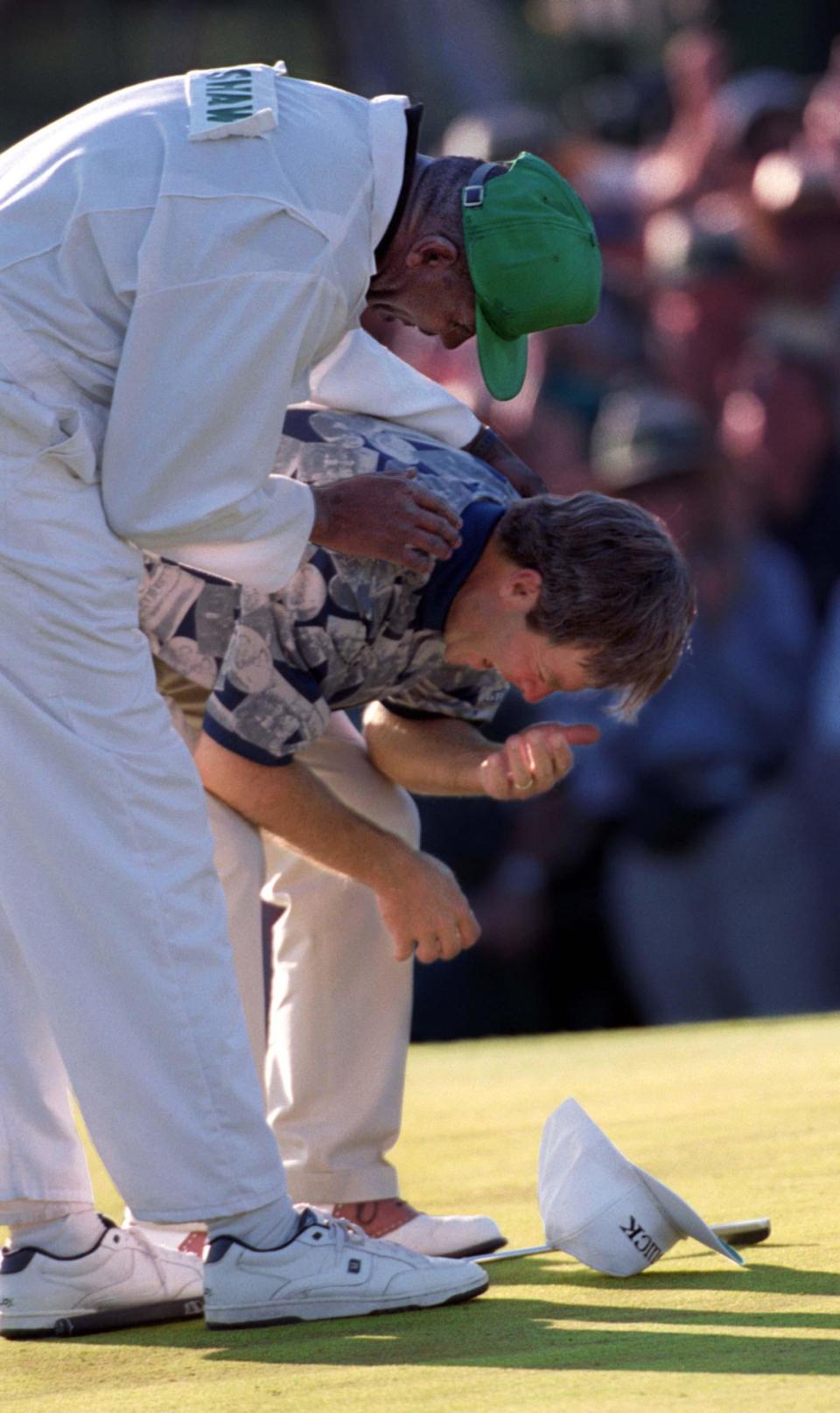
1995: A week after the death of his longtime teacher and mentor Harvey Penick, Ben Crenshaw wins a highly emotional Masters Tournament. U.S. Amateur champion Tiger Woods makes his Masters debut, and after a practice round with Jack Nicklaus, Jack predicts Tiger will eventually win more Masters "than me and Arnold combined."
1997: Tiger Woods launches his fame into another stratosphere with a performance that redefines dominance — his 18-under-par total is a new record, and he finishes two touchdowns ahead of runner-up Tom Kite.
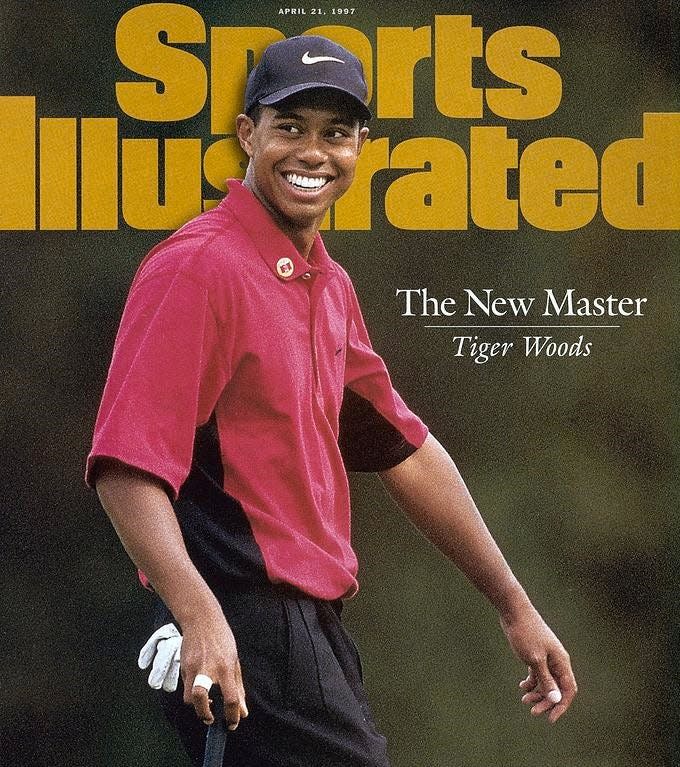
1998: Mark O'Meara wins his first major. Jack Nicklaus, at 58, gets within two of the lead on Sunday's back nine before settling into a tie for sixth.
2001: Tiger Woods earns $1,008,000 for his second Masters victory. It's the first time the winner's purse tops the million-dollar mark. He earns the same amount the following year when he becomes the third golfer to win two straight Masters.
2003: Mike Weir is the first Canadian and first lefty to win the Masters when he beats Len Mattiace in a playoff. Controversy over the club's male-only membership leads to potential sponsor boycotts, which leads to club chairman Hootie Johnson's decision to make the '03 tournament commercial-free on CBS.
Decade Eight: 2004-13
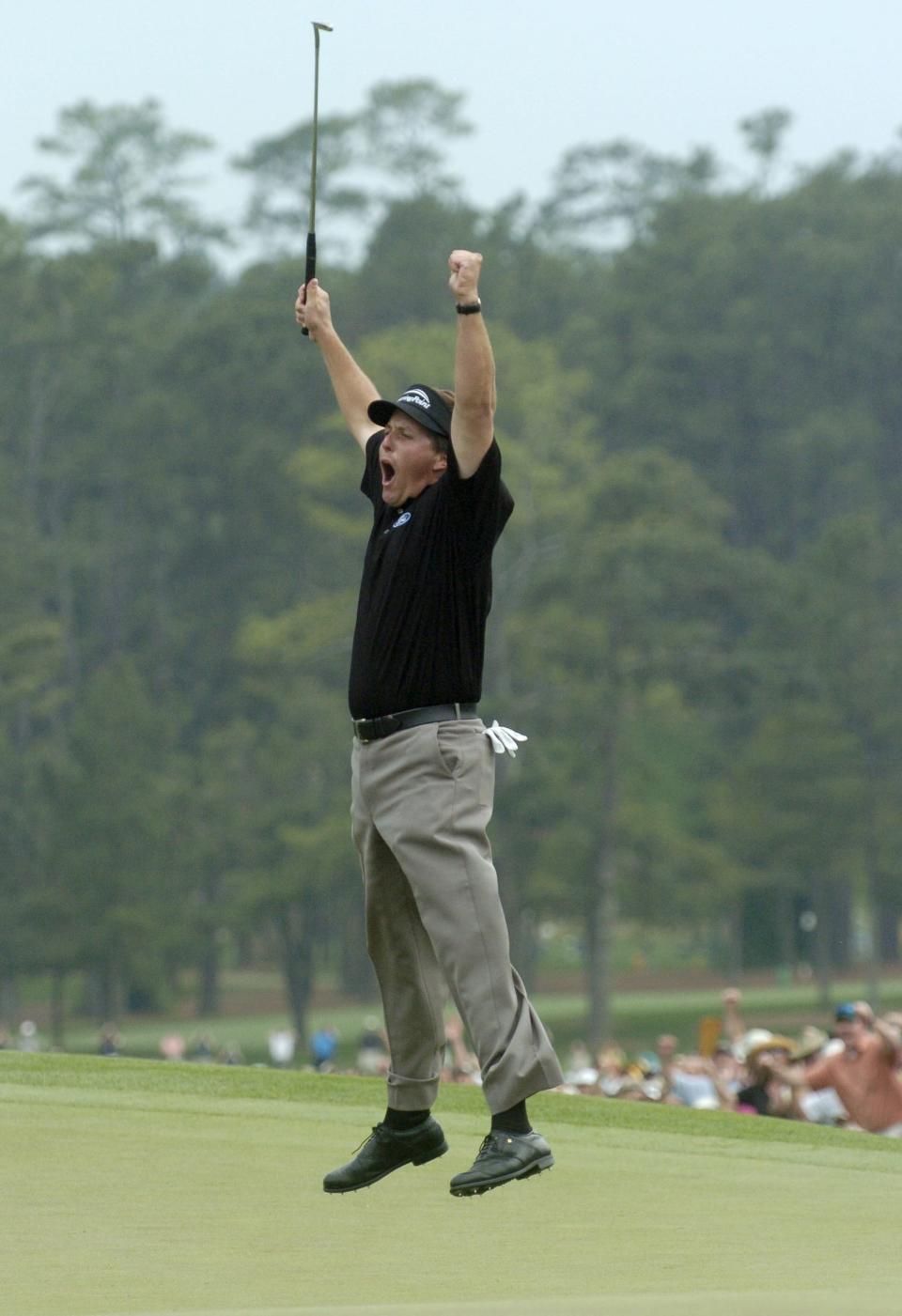
2004: Thumbs-ups all around as Phil Mickelson wins his first major and Arnold Palmer plays his 50th and final Masters.
2005: Tiger Woods' chip on 16 eventually falls into the cup and he goes on to win his fourth Masters, defeating Chris DiMarco in a playoff. At 65, Jack Nicklaus plays his final masters.
2007: Short-knocker Zach Johnson doesn’t reach a par-5 in two all week, yet plays them in a field-best 11 under par and wins at 1 over par, which ties for the highest winning score ever.
2010: Phil Mickelson wins his third Masters. The next morning, he's photographed driving to a local Krispy Kreme drive-thru, wearing his green jacket.
@jjones9 Better than Phil Mickelson hitting the Krispy Kreme drive thru. pic.twitter.com/nNqreOO4w9
— Andrew Stilwell (@stilwell) April 12, 2015
2012: Bubba Watson defeats Louis Oosthuizen in a playoff remembered for Bubba's miraculous hooked wedge from the pines right of the 10th fairway.
2013: Adam Scott becomes the first Aussie to win a Masters. On the Sunday preceding tournament week, Augusta National debuts the Drive, Chip and Putt competition for kids ages 7-15.
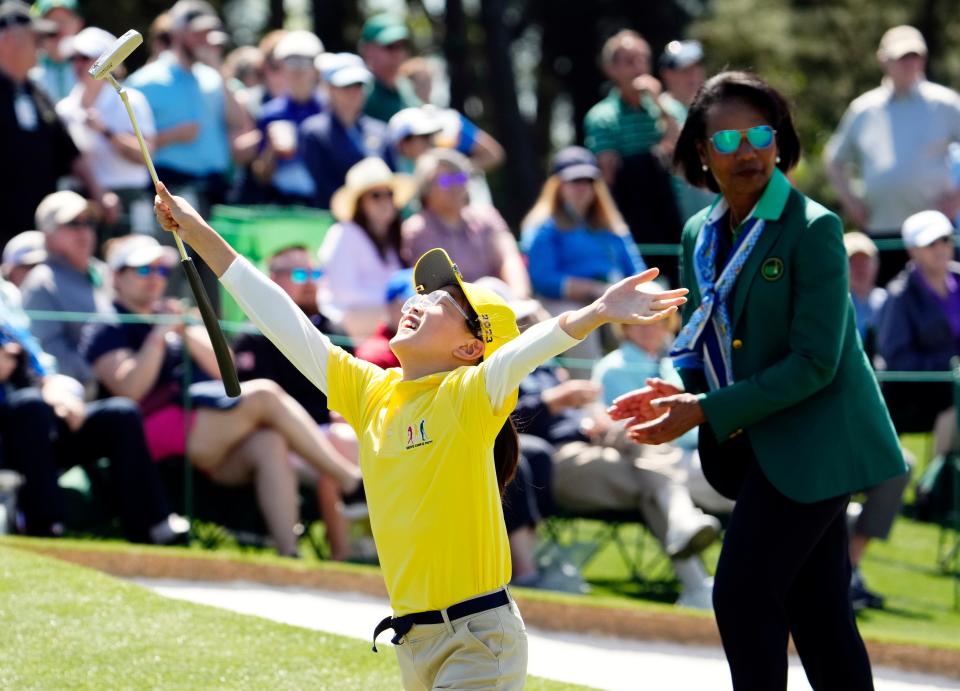
Decade Nine: 2014-23
2015: At Ben Crenshaw’s last Masters, fellow Texan Jordan Spieth goes wire to wire and ties the tournament record at 18 under par.

2016: Tournament lore suggests the Masters doesn't truly begin until the leaders make the nine-hole turn on Sunday. Jordan Spieth turns with a five-shot lead and plays the next three holes in 6 over par, including an 8 on the par-3 12th after dumping two balls into Rae's Creek.
2018: Tom Watson, 68 years old, wins Wednesday's par-3 contest.
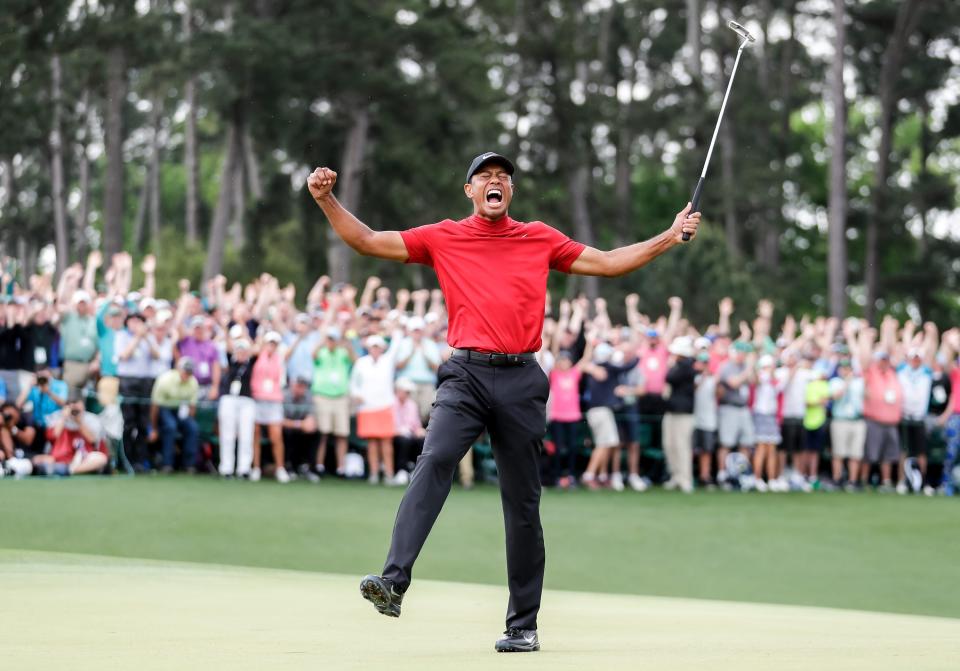
2019: Tiger Woods cements his latest comeback from injury with a Sunday comeback victory for his fifth Masters and 15th professional major. Prior to the Masters, the Augusta National Women's Amateur debuts.
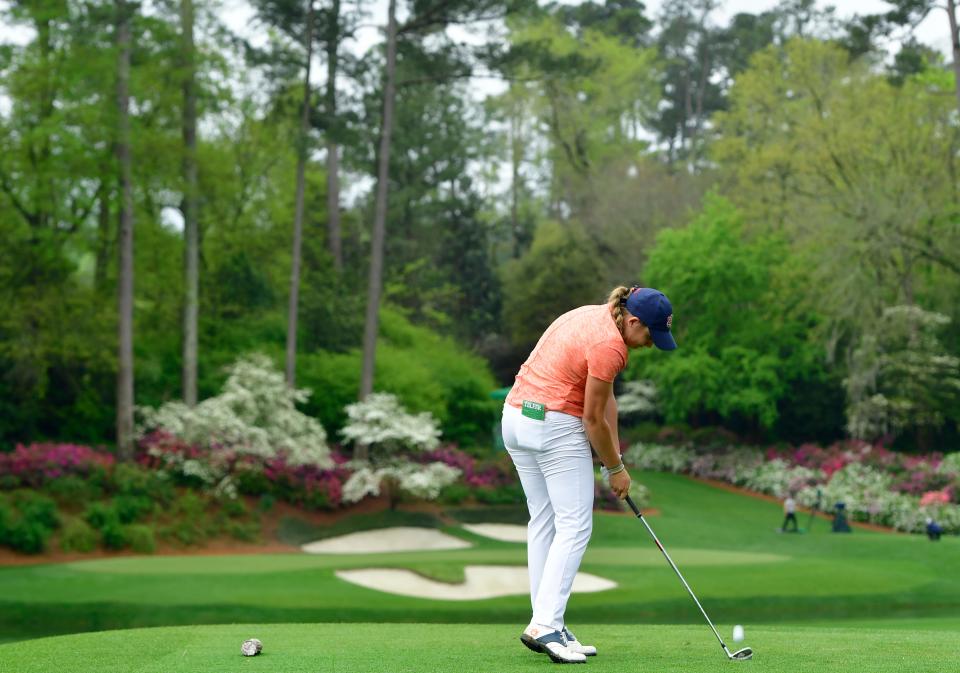
2020: The Covid pandemic forces the Masters to reschedule for November. Dustin Johnson dominates, winning by five with a new record score of 20 under par.
2021: Hideki Matsuyama becomes the first Japanese male to win a major and the first Asian-born golfer to win the Masters.
2023: In the midst of the ongoing LIV Golf drama, Augusta National keeps masters-eligible LIV golfers on the invite list. One of them, Brooks Koepka, blows a Sunday lead to Jon Rahm, who himself would make the LIV leap at year’s end.
This article originally appeared on The Daytona Beach News-Journal: The Masters: Let's play 9! A decade-by-decade look as tourney turns 90

